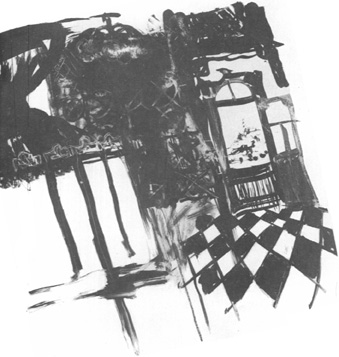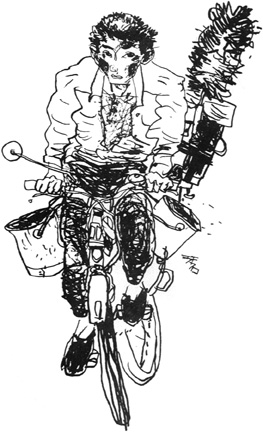O, MACAU MANOR HOUSES
Oh, the manor houses of past days Macau,
Built for the blue sea-light of an Italian Summer,
Though their look plunges into the misty jade
Of nacar and topaz of waters in the bay.
Your balconies have seen at blue-grey dawnings,
The rocking of a junk, the paddles of 'tancars'
Which carried to the harbour the subtle smells
And strong, of fresh sea-food and of distant orchards.
Your balconies did see, petrified, one afternoon,
Eugenia swiftly riding the foam of a horse,
When the royal fragate, in Taipa, explodes and burns
And ends of the 'novel' of Francisco Bordalo.
Your balconies have seen, on hungry tea-time hours,
The I-T'ai who announces tempting buns,
Custards, star-cakes... - come buy beautiful grapefruit...
(The gates would open and the servants run.)
Your balconies have seen, in festive nights.
Little chairs and rickshaws stop, unfolding
Magnificent displays of Chinese silks,
Which made the bodies languid by the fine soft moonlight.
The windowpanes would vibrate under the typhoon's fingers,
The feaces would be marked by pale and anguished looks.
Out there, the trees, the sea in convulsive grimaces;
Inside, the haggard movement of chess.
What luxury inside you!
The eastern piece of furniture, bright and grave,
The Canton jars, the multicoloured glassapanes,
Pictures with flowers where only one bird flies.
Soft carpets, ottoman sofas,
The piano, snooker table under a cool 'pancá'.
The little silver spoons which scratch the china
Of coconut-perfumed cups around tea-time.
Your masters: viscounts and barons,
Some wealthy Chinese with an acquired taste.
Around the waltzes the evenings used to turn,
The ladies putting on three different dresses.
One morning you woke up to find yourselves surrounded
By concrete blocks and strident sounds of horns
And, today, your façades
Are nothing but old tired eyelids
Closed and ill - and, oh, so ill...
(8.6.86)
 Designer by Ung Wai Meng © Copyright
Designer by Ung Wai Meng © Copyright
TO JAU
I am your presence, at your feet, quiet, unmoving,
0 Jau, with whom I identify so much,
In this grot where I am and hear the cricket chant Which is, today, the voice of your poet.
António I am (mine is your name)
And a slave, also I am, to poetry.
It is to her I reach out every day
My hand to my own hunger.
(10.6.86)
AT THE TEMPLE OF KUN-IAM
At the table where, in 1844, the Sino-American
trade treaty was signed.
The material: the stone, where time can be read.
The shape: round (all around it, equal!).
The dimension: two stretched out arms
So that the hands of brothers can be shaken.
The name: a table. The symbol: the ring,
the fertile agreement
Between peoples, which clears the road to hope
In the world.
Those who sit here should deeply meditate
Upon the harmony of manners and of friendship.
And only then can they go out and face
The pale, rose-coloured face of the city.
(28.6.86)
AT THE GRAVE OF CAMILO PESSANHA
In his plain ground grave, the granite stone
Is an offense to him in the arm of nobility,
In the mispelt name
(With Doutor and with d'Almeida).
Who has stolen its surrounding iron chains
(The heart still, fearing handcuffs.)
Who has torn and polluted the sheet of exile
Which covered, in his burial, his bones and his poems?
There he is, though not there now, no longer a prisoner,
Gliding at last (as he once wanted to)
Noiselessly, disappearing, like a worm, into the ground.
And he sees the darkness in a lost
Country of secrecy and solitude.
(9.7.86)
BY THE STATUE OF JORGE ÁLVARES
There he is, his arm held up, greeting land and people,
By the uprightness of the 'padrão'
Just like the one he left planted in Tamau
And which brought Portugal to the East of the East.
He came in a junk of which he was the maker
And had bought in Pegu for some thousand 'viças';
He came without hate, he came without avarice,
Our destiny is adventure, faith, and love.
In the ground which he had made Portuguese
He burried his own son. And there too, as an old man,
In the brotherly arms of Duarte Coelho,
He vanished forever.
He arrived, not having got there, to this place:
He belongs more to Macau than Ulysses to Lisboa
As sung by Pessoa
In his Mensagem.
(17.7.86)
T. N: 'padrão': a word for which there is no appropriate translation: a stone monument bearing the national arms which used to be erected in the lands discovered by the Portuguese
THE CAR WASHER
He has surely learned how to ride his bicycle
There where the goat is chewing a rice spike
And the street is but a nimble bicycle
With four million wheels rolling along.
Now he rides the whole city
(His bucket of water, the cloth, the funny profile
Of his raised up feather duster, like a cat's tail),
Looking for a muddy, dusty customer.
He knows all his number plates by heart.
His heart aches with the sight of any sign of crashing
And then he wets his cloth, caressing it so softly,
As is it were a bruise and he could make it better.
Flowers keep falling, with such burning perfume
Upon the shiny surface of the capote.
'Throws them away, for upon it, reflected,
Nought but his pale Narcissus face he likes to see.
Then, back on his bicycle, he goes,
The unique Centaur! I would much rather,
Instead of painting him in lines which have no poetry,
Draw a single-line drawing of his silhouette.
(13.6.86)

Designer by Ung Wai Meng © Copyright
start p. 65
end p.